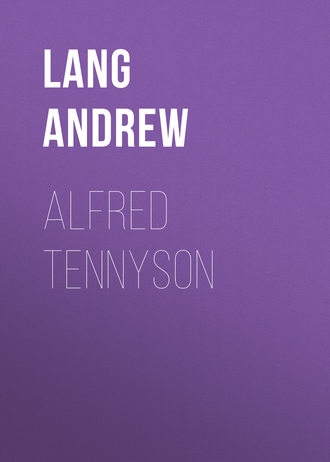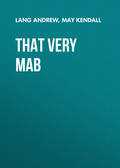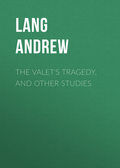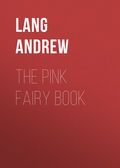
Lang Andrew
Alfred Tennyson
In 1884, after this voyage, with its royal functions and celebrations at Copenhagen, a peerage was offered to the poet. He “did not want to alter his plain Mr,” and he must have known that, whether he accepted or refused, the chorus of blame would be louder than that of applause. Scott had desired “such grinning honour as Sir Walter hath”; the title went well with the old name, and pleased his love of old times. Tennyson had been blamed “by literary men” for thrice evading a baronetcy, and he did not think that a peerage would make smooth the lives of his descendants. But he concluded, “Why should I be selfish and not suffer an honour (as Gladstone says) to be done to literature in my name?” Politically, he thought that the Upper House, while it lasts, partly supplied the place of the American “referendum.” He voted in July 1884 for the extension of the franchise, and in November stated his views to Mr Gladstone in verse. In prose he wrote to Mr Gladstone, “I have a strong conviction that the more simple the dealings of men with men, as well as of man with man, are – the better,” a sentiment which, perhaps, did not always prevail with his friend. The poet’s reflections on the horror of Gordon’s death are not recorded. He introduced the idea of the Gordon Home for Boys, and later supported it by a letter, “Have we forgotten Gordon?” to the Daily Telegraph. They who cannot forget Gordon must always be grateful to Tennyson for providing this opportunity of honouring the greatest of an illustrious clan, and of helping, in their degree, a scheme which was dear to the heroic leader.
The poet, very naturally, was most averse to personal appearance in public matters. Mankind is so fashioned that the advice of a poet is always regarded as unpractical, and is even apt to injure the cause which he advocates. Happily there cannot be two opinions about the right way of honouring Gordon. Tennyson’s poem, The Fleet, was also in harmony with the general sentiment.
In the last month of 1884 Becket was published. The theme of Fair Rosamund had appealed to the poet in youth, and he had written part of a lyric which he judiciously left unpublished. It is given in his Biography. In 1877 he had visited Canterbury, and had traced the steps of Becket to his place of slaughter in the Cathedral. The poem was printed in 1879, but not published till seven years later. In 1879 Sir Henry Irving had thought the play too costly to be produced with more than a succès d’estime; but in 1891 he put it on the stage, where it proved the most successful of modern poetic dramas. As published it is, obviously, far too long for public performance. It is not easy to understand why dramatic poets always make their works so much too long. The drama seems, by its very nature, to have a limit almost as distinct as the limit of the sonnet. It is easy to calculate how long a play for the stage ought to be, and we might think that a poet would find the natural limit serviceable to his art, for it inculcates selection, conciseness, and concentration. But despite these advantages of the natural form of the drama, modern poets, at least, constantly overflow their banks. The author ruit profusus, and the manager has to reduce the piece to feasible proportions, such as it ought to have assumed from the first.
Becket has been highly praised by Sir Henry Irving himself, for its “moments of passion and pathos… which, when they exist, atone to an audience for the endurance of long acts.” But why should the audience have such long acts to endure? The reader, one fears, is apt to use his privilege of skipping. The long speeches of Walter Map and the immense period of Margery tempt the student to exercise his agility. A “chronicle play” has the privilege of wandering, but Becket wanders too far and too long. The political details of the quarrel between Church and State, with its domestic and international complexities, are apt to fatigue the attention. Inevitable and insoluble as the situation was, neither protagonist is entirely sympathetic, whether in the play or in history. The struggle in Becket between his love of the king and his duty to the Church (or what he takes to be his duty) is nobly presented, and is truly dramatic, while there is grotesque and terrible relief in the banquet of the Beggars. In the scene of the assassination the poet “never stoops his wing,” and there are passages of tender pathos between Henry and Rosamund, while Becket’s keen memories of his early days, just before his death, are moving.
“Becket. I once was out with Henry in the days
When Henry loved me, and we came upon
A wild-fowl sitting on her nest, so still
I reach’d my hand and touch’d; she did not stir;
The snow had frozen round her, and she sat
Stone-dead upon a heap of ice-cold eggs.
Look! how this love, this mother, runs thro’ all
The world God made – even the beast – the bird!
John of Salisbury. Ay, still a lover of the beast and bird?
But these arm’d men – will you not hide yourself?
Perchance the fierce De Brocs from Saltwood Castle,
To assail our Holy Mother lest she brood
Too long o’er this hard egg, the world, and send
Her whole heart’s heat into it, till it break
Into young angels. Pray you, hide yourself.
Becket. There was a little fair-hair’d Norman maid
Lived in my mother’s house: if Rosamund is
The world’s rose, as her name imports her – she
Was the world’s lily.
John of Salisbury. Ay, and what of her?
Becket. She died of leprosy.”
But the part of Rosamund, her innocent ignorance especially, is not very readily intelligible, not quite persuasive, and there is almost a touch of the burlesque in her unexpected appearance as a monk. To weave that old and famous story of love into the terribly complex political intrigue was a task almost too great. The character of Eleanor is perhaps more successfully drawn in the Prologue than in the scene where she offers the choice of the dagger or the bowl, and is interrupted, in a startlingly unexpected manner, by the Archbishop himself. The opportunities for scenic effects are magnificent throughout, and must have contributed greatly to the success on the stage. Still one cannot but regard the published Becket as rather the marble from which the statue may be hewn than as the statue itself. There are fine scenes, powerful and masterly drawing of character in Henry, Eleanor, and Becket, but there is a want of concentration, due, perhaps, to the long period of time covered by the action. So, at least, it seems to a reader who has admitted his sense of incompetency in the dramatic region. The acuteness of the poet’s power of historical intuition was attested by Mr J. R. Green and Mr Bryce. “One cannot imagine,” said Mr Bryce, “a more vivid, a more perfectly faithful picture than it gives both of Henry and Thomas.” Tennyson’s portraits of these two “go beyond and perfect history.” The poet’s sympathy ought, perhaps, to have been, if not with the false and ruffianly Henry, at least with Henry’s side of the question. For Tennyson had made Harold leave
“To England
My legacy of war against the Pope
From child to child, from Pope to Pope, from age to age,
Till the sea wash her level with her shores,
Or till the Pope be Christ’s.”
IX.
LAST YEARS
The end of 1884 saw the publication of Tiresias and other Poems, dedicated to “My good friend, Robert Browning,” and opening with the beautiful verses to one who never was Mr Browning’s friend, Edward FitzGerald. The volume is rich in the best examples of Tennyson’s later work. Tiresias, the monologue of the aged seer, blinded by excess of light when he beheld Athene unveiled, and under the curse of Cassandra, is worthy of the author who, in youth, wrote Œnone and Ulysses. Possibly the verses reflect Tennyson’s own sense of public indifference to the voice of the poet and the seer. But they are of much earlier date than the year of publication: —
“For when the crowd would roar
For blood, for war, whose issue was their doom,
To cast wise words among the multitude
Was flinging fruit to lions; nor, in hours
Of civil outbreak, when I knew the twain
Would each waste each, and bring on both the yoke
Of stronger states, was mine the voice to curb
The madness of our cities and their kings.
Who ever turn’d upon his heel to hear
My warning that the tyranny of one
Was prelude to the tyranny of all?
My counsel that the tyranny of all
Led backward to the tyranny of one?
This power hath work’d no good to aught that lives.”
The conclusion was a favourite with the author, and his blank verse never reached a higher strain: —
“But for me,
I would that I were gather’d to my rest,
And mingled with the famous kings of old,
On whom about their ocean-islets flash
The faces of the Gods – the wise man’s word,
Here trampled by the populace underfoot,
There crown’d with worship – and these eyes will find
The men I knew, and watch the chariot whirl
About the goal again, and hunters race
The shadowy lion, and the warrior-kings,
In height and prowess more than human, strive
Again for glory, while the golden lyre
Is ever sounding in heroic ears
Heroic hymns, and every way the vales
Wind, clouded with the grateful incense-fume
Of those who mix all odour to the Gods
On one far height in one far-shining fire.”
Then follows the pathetic piece on FitzGerald’s death, and the prayer, not unfulfilled —
“That, when I from hence
Shall fade with him into the unknown,
My close of earth’s experience
May prove as peaceful as his own.”
The Ancient Sage, with its lyric interludes, is one of Tennyson’s meditations on the mystery of the world and of existence. Like the poet himself, the Sage finds a gleam of light and hope in his own subjective experiences of some unspeakable condition, already recorded in In Memoriam. The topic was one on which he seems to have spoken to his friends with freedom: —
“And more, my son! for more than once when I
Sat all alone, revolving in myself
The word that is the symbol of myself,
The mortal limit of the Self was loosed,
And past into the Nameless, as a cloud
Melts into Heaven. I touch’d my limbs, the limbs
Were strange not mine – and yet no shade of doubt,
But utter clearness, and thro’ loss of Self
The gain of such large life as match’d with ours
Were Sun to spark – unshadowable in words,
Themselves but shadows of a shadow-world.”
The poet’s habit of
“Revolving in myself
The word that is the symbol of myself” —
that is, of dwelling on the sound of his own name, was familiar to the Arabs. M. Lefébure has drawn my attention to a passage in the works of a mediæval Arab philosopher, Ibn Khaldoun: 17 “To arrive at the highest degree of inspiration of which he is capable, the diviner should have recourse to the use of certain phrases marked by a peculiar cadence and parallelism. Thus he emancipates his mind from the influence of the senses, and is enabled to attain an imperfect contact with the spiritual world.” Ibn Khaldoun regards the “contact” as extremely “imperfect.” He describes similar efforts made by concentrating the gaze on a mirror, a bowl of water, or the like. Tennyson was doubtless unaware that he had stumbled accidentally on a method of “ancient sages.” Psychologists will explain his experience by the word “dissociation.” It is not everybody, however, who can thus dissociate himself. The temperament of genius has often been subject to such influence, as M. Lefébure has shown in the modern instances of George Sand and Alfred de Musset: we might add Shelley, Goethe, and even Scott.
The poet’s versatility was displayed in the appearance with these records of “weird seizures”, of the Irish dialect piece To-morrow, the popular Spinster’s Sweet-Arts, and the Locksley Hall Sixty Years After. The old fire of the versification is unabated, but the hero has relapsed on the gloom of the hero of Maud. He represents himself, of course, not Tennyson, or only one of the moods of Tennyson, which were sometimes black enough. A very different mood chants the Charge of the Heavy Brigade, and speaks of
“Green Sussex fading into blue
With one gray glimpse of sea.”
The lines To Virgil were written at the request of the Mantuans, by the most Virgilian of all the successors of the
“Wielder of the stateliest measure
ever moulded by the lips of man.”
Never was Tennyson more Virgilian than in this unmatched panegyric, the sum and flower of criticism of that
“Golden branch amid the shadows,
kings and realms that pass to rise no more.”
Hardly less admirable is the tribute to Catullus, and the old poet is young again in the bird-song of Early Spring. The lines on Poets and their Bibliographies, with The Dead Prophet, express Tennyson’s lifelong abhorrence of the critics and biographers, whose joy is in the futile and the unimportant, in personal gossip and the sweepings of the studio, the salvage of the wastepaper basket. The Prefatory Poem to my Brother’s Sonnets is not only touching in itself, but proves that the poet can “turn to favour and to prettiness” such an affliction as the ruinous summer of 1879.
The year 1880 brought deeper distress in the death of the poet’s son Lionel, whose illness, begun in India, ended fatally in the Red Sea. The interest of the following years was mainly domestic. The poet’s health, hitherto robust, was somewhat impaired in 1888, but his vivid interest in affairs and in letters was unabated. He consoled himself with Virgil, Keats, Wordsworth, Gibbon, Euripides, and Mr Leaf’s speculations on the composite nature of the Iliad, in which Coleridge, perhaps alone among poets, believed. “You know,” said Tennyson to Mr Leaf; “I never liked that theory of yours about the many poets.” It would be at least as easy to prove that there were many authors of Ivanhoe, or perhaps it would be a good deal more easy. However, he admitted that three lines which occur both in the Eighth and the Sixteenth Books of the Iliad are more appropriate in the later book. Similar examples might be found in his own poems. He still wrote, in the intervals of a malady which brought him “as near death as a man could be without dying.” He was an example of the great physical strength which, on the whole, seems usually to accompany great mental power. The strength may be dissipated by passion, or by undue labour, as in cases easily recalled to memory, but neither cause had impaired the vigour of Tennyson. Like Goethe, he lived out all his life; and his eightieth birthday was cheered both by public and private expressions of reverence and affection.
Of Tennyson’s last three years on earth we may think, in his own words, that his
“Life’s latest eve endured
Nor settled into hueless grey.”
Nature was as dear to him and as inspiring as of old; men and affairs and letters were not slurred by his intact and energetic mind. His Demeter and other Poems, with the dedication to Lord Dufferin, appeared in the December of the year. The dedication was the lament for the dead son and the salutation to the Viceroy of India, a piece of resigned and manly regret. The Demeter and Persephone is a modern and tender study of the theme of the most beautiful Homeric Hymn. The ancient poet had no such thought of the restored Persephone as that which impels Tennyson to describe her
“Faint as a climate-changing bird that flies
All night across the darkness, and at dawn
Falls on the threshold of her native land.”
The spring, the restored Persephone, comes more vigorous and joyous to the shores of the Ægean than to ours. All Tennyson’s own is Demeter’s awe of those “imperial disimpassioned eyes” of her daughter, come from the bed and the throne of Hades, the Lord of many guests. The hymn, happy in its ending, has no thought of the grey heads of the Fates, and their answer to the goddess concerning “fate beyond the Fates,” and the breaking of the bonds of Hades. The ballad of Owd Roä is one of the most spirited of the essays in dialect to which Tennyson had of late years inclined. Vastness merely expresses, in terms of poetry, Tennyson’s conviction that, without immortality, life is a series of worthless contrasts. An opposite opinion may be entertained, but a man has a right to express his own, which, coming from so great a mind, is not undeserving of attention; or, at least, is hardly deserving of reproof. The poet’s idea is also stated thus in The Ring, in terms which perhaps do not fall below the poetical; or, at least, do not drop into “the utterly unpoetical”: —
“The Ghost in Man, the Ghost that once was Man,
But cannot wholly free itself from Man,
Are calling to each other thro’ a dawn
Stranger than earth has ever seen; the veil
Is rending, and the Voices of the day
Are heard across the Voices of the dark.
No sudden heaven, nor sudden hell, for man,
But thro’ the Will of One who knows and rules —
And utter knowledge is but utter love —
Æonian Evolution, swift or slow,
Thro’ all the Spheres – an ever opening height,
An ever lessening earth.”
The Ring is, in fact, a ghost story based on a legend told by Mr Lowell about a house near where he had once lived; one of those houses vexed by
“A footstep, a low throbbing in the walls,
A noise of falling weights that never fell,
Weird whispers, bells that rang without a hand,
Door-handles turn’d when none was at the door,
And bolted doors that open’d of themselves.”
These phenomena were doubtless caused by rats and water-pipes, but they do not destroy the pity and the passion of the tale. The lines to Mary Boyle are all of the normal world, and worthy of a poet’s youth and of the spring. Merlin and the Gleam is the spiritual allegory of the poet’s own career: —
“Arthur had vanish’d
I knew not whither,
The king who loved me,
And cannot die.”
So at last
“All but in Heaven
Hovers The Gleam,”
whither the wayfarer was soon to follow. There is a marvellous hope and pathos in the melancholy of these all but the latest songs, reminiscent of youth and love, and even of the dim haunting memories and dreams of infancy. No other English poet has thus rounded all his life with music. Tennyson was in his eighty-first year, when there “came in a moment” the crown of his work, the immortal lyric, Crossing the Bar. It is hardly less majestic and musical in the perfect Greek rendering by his brother-in-law, Mr Lushington. For once at least a poem has been “poured from the golden to the silver cup” without the spilling of a drop. The new book’s appearance was coincident with the death of Mr Browning, “so loving and appreciative,” as Lady Tennyson wrote; a friend, not a rival, however the partisans of either poet might strive to stir emulation between two men of such lofty and such various genius.
X.
1890
In the year 1889 the poet’s health had permitted him to take long walks on the sea-shore and along the cliffs, one of which, by reason of its whiteness, he had named “Taliessin,” “the splendid brow.” His mind ran on a poem founded on an Egyptian legend (of which the source is not mentioned), telling how “despair and death came upon him who was mad enough to try to probe the secret of the universe.” He also thought of a drama on Tristram, who, in the Idylls, is treated with brevity, and not with the sympathy of the old writer who cries, “God bless Tristram the knight: he fought for England!” But early in 1890 Tennyson suffered from a severe attack of influenza. In May Mr Watts painted his portrait, and
“Divinely through all hindrance found the man.”
Tennyson was a great admirer of Miss Austen’s novels: “The realism and life-likeness of Miss Austen’s Dramatis Personæ come nearest to those of Shakespeare. Shakespeare, however, is a sun to which Jane Austen, though a bright and true little world, is but an asteroid.” He was therefore pleased to find apple-blossoms co-existing with ripe strawberries on June 28, as Miss Austen has been blamed, by minute philosophers, for introducing this combination in the garden party in Emma. The poet, like most of the good and great, read novels eagerly, and excited himself over the confirmation of an adult male in a story by Miss Yonge. Of Scott, “the most chivalrous literary figure of the century, and the author with the widest range since Shakespeare,” he preferred Old Mortality, and it is a good choice. He hated “morbid and introspective tales, with their oceans of sham philosophy.” At this time, with catholic taste, he read Mr Stevenson and Mr Meredith, Miss Braddon and Mr Henry James, Ouida and Mr Thomas Hardy; Mr Hall Caine and Mr Anstey; Mrs Oliphant and Miss Edna Lyall. Not everybody can peruse all of these very diverse authors with pleasure. He began his poem on the Roman gladiatorial combats; indeed his years, fourscore and one, left his intellectual eagerness as unimpaired as that of Goethe. “A crooked share,” he said to the Princess Louise, “may make a straight furrow.” “One afternoon he had a long waltz with M – in the ballroom.” Speaking of
“All the charm of all the Muses
Often flowering in a lonely word”
in Virgil, he adduced, rather strangely, the cunctantem ramum, said of the Golden Bough, in the Sixth Æneid. The choice is odd, because the Sibyl has just told Æneas that, if he be destined to pluck the branch of gold, ipse volens facilisque sequetur, “it will come off of its own accord,” like the sacred ti branches of the Fijians, which bend down to be plucked for the Fire rite. Yet, when the predestined Æneas tries to pluck the bough of gold, it yields reluctantly (cunctantem), contrary to what the Sibyl has foretold. Mr Conington, therefore, thought the phrase a slip on the part of Virgil. “People accused Virgil of plagiarising,” he said, “but if a man made it his own there was no harm in that (look at the great poets, Shakespeare included).” Tennyson, like Virgil, made much that was ancient his own; his verses are often, and purposefully, a mosaic of classical reminiscences. But he was vexed by the hunters after remote and unconscious resemblances, and far-fetched analogies between his lines and those of others. He complained that, if he said that the sun went down, a parallel was at once cited from Homer, or anybody else, and he used a very powerful phrase to condemn critics who detected such repetitions. “The moanings of the homeless sea,” – “moanings” from Horace, “homeless” from Shelley. “As if no one else had ever heard the sea moan except Horace!” Tennyson’s mixture of memory and forgetfulness was not so strange as that of Scott, and when he adapted from the Greek, Latin, or Italian, it was of set purpose, just as it was with Virgil. The beautiful lines comparing a girl’s eyes to bottom agates that seem to
“Wave and float
In crystal currents of clear running seas,”
he invented while bathing in Wales. It was his habit, to note down in verse such similes from nature, and to use them when he found occasion. But the higher criticism, analysing the simile, detected elements from Shakespeare and from Beaumont and Fletcher.
In June 1891 the poet went on a tour in Devonshire, and began his Akbar, and probably wrote June Bracken and Heather; or perhaps it was composed when “we often sat on the top of Blackdown to watch the sunset.” He wrote to Mr Kipling —
“The oldest to the youngest singer
That England bore”
(to alter Mr Swinburne’s lines to Landor), praising his Flag of England. Mr Kipling replied as “the private to the general.”
Early in 1892 The Foresters was successfully produced at New York by Miss Ada Rehan, the music by Sir Arthur Sullivan, and the scenery from woodland designs by Whymper. Robin Hood (as we learn from Mark Twain) is a favourite hero with the youth of America. Mr Tom Sawyer himself took, in Mark Twain’s tale, the part of the bold outlaw.
The Death of Œnone was published in 1892, with the dedication to the Master of Balliol —
“Read a Grecian tale retold
Which, cast in later Grecian mould,
Quintus Calaber
Somewhat lazily handled of old.”
Quintus Calaber, more usually called Quintus Smyrnæus, is a writer of perhaps the fourth century of our era. About him nothing, or next to nothing, is known. He told, in so late an age, the conclusion of the Tale of Troy, and (in the writer’s opinion) has been unduly neglected and disdained. His manner, I venture to think, is more Homeric than that of the more famous and doubtless greater Alexandrian poet of the Argonautic cycle, Apollonius Rhodius, his senior by five centuries. His materials were probably the ancient and lost poems of the Epic Cycle, and the story of the death of Œnone may be from the Little Iliad of Lesches. Possibly parts of his work may be textually derived from the Cyclics, but the topic is very obscure. In Quintus, Paris, after encountering evil omens on his way, makes a long speech, imploring the pardon of the deserted Œnone. She replies, not with the Tennysonian brevity; she sends him back to the helpless arms of her rival, Helen. Paris dies on the hills; never did Helen see him returning. The wood-nymphs bewail Paris, and a herdsman brings the bitter news to Helen, who chants her lament. But remorse falls on Œnone. She does not go
“Slowly down
By the long torrent’s ever-deepened roar,”
but rushes “swift as the wind to seek and spring upon the pyre of her lord.” Fate and Aphrodite drive her headlong, and in heaven Selene, remembering Endymion, bewails the lot of her sister in sorrow. Œnone reaches the funeral flame, and without a word or a cry leaps into her husband’s arms, the wild Nymphs wondering. The lovers are mingled in one heap of ashes, and these are bestowed in one vessel of gold and buried in a howe. This is the story which the poet rehandled in his old age, completing the work of his happy youth when he walked with Hallam in the Pyrenean hills, that were to him as Ida. The romance of Œnone and her death condone, as even Homer was apt to condone, the sins of beautiful Paris, whom the nymphs lament, despite the evil that he has wrought. The silence of the veiled Œnone, as she springs into her lover’s last embrace, is perhaps more affecting and more natural than Tennyson’s
“She lifted up a voice
Of shrill command, ‘Who burns upon the pyre?’”
The St Telemachus has the old splendour and vigour of verse, and, though written so late in life, is worthy of the poet’s prime: —
“Eve after eve that haggard anchorite
Would haunt the desolated fane, and there
Gaze at the ruin, often mutter low
‘Vicisti Galilæe’; louder again,
Spurning a shatter’d fragment of the God,
‘Vicisti Galilæe!’ but – when now
Bathed in that lurid crimson – ask’d ‘Is earth
On fire to the West? or is the Demon-god
Wroth at his fall?’ and heard an answer ‘Wake
Thou deedless dreamer, lazying out a life
Of self-suppression, not of selfless love.’
And once a flight of shadowy fighters crost
The disk, and once, he thought, a shape with wings
Came sweeping by him, and pointed to the West,
And at his ear he heard a whisper ‘Rome,’
And in his heart he cried ‘The call of God!’
And call’d arose, and, slowly plunging down
Thro’ that disastrous glory, set his face
By waste and field and town of alien tongue,
Following a hundred sunsets, and the sphere
Of westward-wheeling stars; and every dawn
Struck from him his own shadow on to Rome.
Foot-sore, way-worn, at length he touch’d his goal,
The Christian city.”
Akbar’s Dream may be taken, more or less, to represent the poet’s own theology of a race seeking after God, if perchance they may find Him, and the closing Hymn was a favourite with Tennyson. He said, “It is a magnificent metre”: —
“Hymn
I
Once again thou flamest heavenward, once again we see thee rise.
Every morning is thy birthday gladdening human hearts and eyes.
Every morning here we greet it, bowing lowly down before thee,
Thee the Godlike, thee the changeless in thine ever-changing skies.
II
Shadow-maker, shadow-slayer, arrowing light from clime to clime,
Hear thy myriad laureates hail thee monarch in their woodland rhyme.
Warble bird, and open flower, and, men, below the dome of azure
Kneel adoring Him the Timeless in the flame that measures Time!”
In this final volume the poet cast his handful of incense on the altar of Scott, versifying the tale of Il Bizarro, which the dying Sir Walter records in his Journal in Italy. The Churchwarden and the Curate is not inferior to the earlier peasant poems in its expression of shrewdness, humour, and superstition. A verse of Poets and Critics may be taken as the poet’s last word on the old futile quarrel: —
“This thing, that thing is the rage,
Helter-skelter runs the age;
Minds on this round earth of ours
Vary like the leaves and flowers,
Fashion’d after certain laws;
Sing thou low or loud or sweet,
All at all points thou canst not meet,
Some will pass and some will pause.
What is true at last will tell:
Few at first will place thee well;
Some too low would have thee shine,
Some too high – no fault of thine —
Hold thine own, and work thy will!
Year will graze the heel of year,
But seldom comes the poet here,
And the Critic’s rarer still.”
Still the lines hold good —
“Some too low would have thee shine,
Some too high – no fault of thine.”
The end was now at hand. A sense of weakness was felt by the poet on September 3, 1892: on the 28th his family sent for Sir Andrew Clark; but the patient gradually faded out of life, and expired on Thursday, October 6, at 1.35 A.M. To the very last he had Shakespeare by him, and his windows were open to the sun; on the last night they were flooded by the moonlight. The description of the final scenes must be read in the Biography by the poet’s son. “His patience and quiet strength had power upon those who were nearest and dearest to him; we felt thankful for the love and the utter peace of it all.” “The life after death,” Tennyson had said just before his fatal illness, “is the cardinal point of Christianity. I believe that God reveals Himself in every individual soul; and my idea of Heaven is the perpetual ministry of one soul to another.” He had lived the life of heaven upon earth, being in all his work a minister of things honourable, lovely, consoling, and ennobling to the souls of others, with a ministry which cannot die. His body sleeps next to that of his friend and fellow-poet, Robert Browning, in front of Chaucer’s monument in the Abbey.







